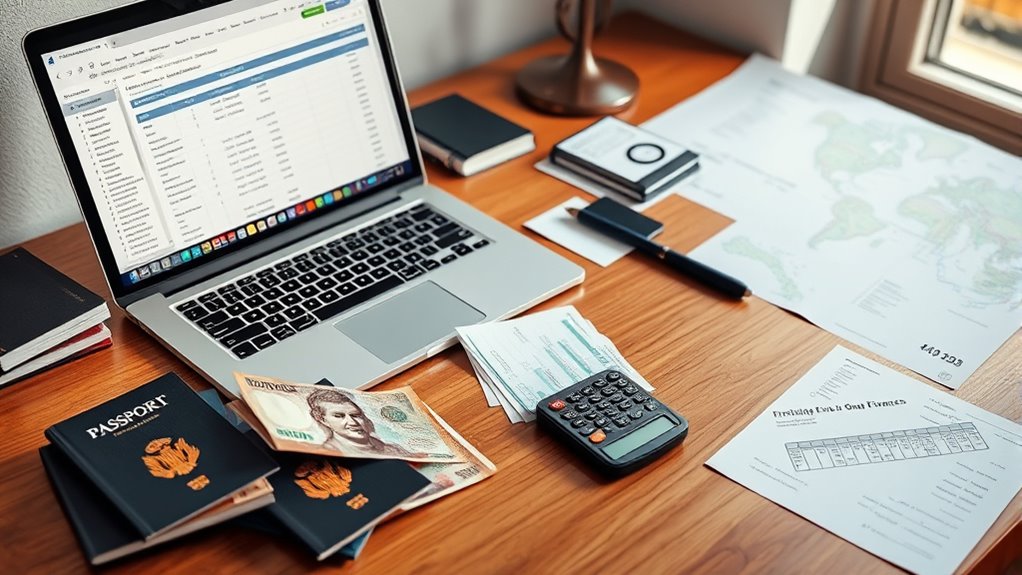To manage your money across borders effectively, you need proper documentation like tax residency certificates, proof of income, and records of foreign tax payments. Keep track of currency exchanges with receipts and bank statements to verify transactions and optimize conversions. Staying organized helps you meet tax obligations, open local accounts, and claim benefits with ease. Proper records also shield you during audits and legal inquiries, making your financial journey smoother—continue to explore key documents that can make this process even clearer.
Key Takeaways
- Maintain comprehensive records of tax residency certificates, income proof, and foreign tax payments to ensure compliance and facilitate tax filings.
- Keep detailed currency exchange records, bank statements, and conversion receipts to verify funds and optimize cross-border transactions.
- Understand and utilize tax treaties to reduce liabilities and avoid double taxation when managing international income.
- Organize documentation for opening local bank accounts, applying for visas, and claiming tax benefits across different countries.
- Regularly update and store financial records to provide quick verification, ensure legal protection, and streamline audits or inquiries.

Are you prepared with the right financial documents when living abroad? Being an expat means juggling more than just packing your belongings; it also involves managing your finances across borders. One of the most critical aspects is guaranteeing your tax compliance. Different countries have varying tax laws, and failing to meet these obligations can lead to hefty penalties or legal trouble. To stay on top of this, you need proper documentation such as tax residency certificates, proof of income, and records of foreign tax payments. These documents help you navigate your home country’s tax requirements and avoid double taxation. Keeping detailed records not only simplifies your tax filings but also proves your compliance if questioned by authorities. Additionally, understanding the tax treaties between your home country and your new residence can minimize your tax liabilities, but only if you have the right paperwork in place.
Another key consideration is currency exchange. When living abroad, you’ll frequently need to convert your funds, whether you’re paying bills, sending money home, or making investments. Having proper documentation related to currency exchange transactions, such as receipts, bank statements, and records of conversions, helps you track your financial activity and avoid potential issues like overestimating your available funds. These records can also facilitate smoother tax reporting, as some countries require detailed disclosures of foreign income and assets. Furthermore, being aware of exchange rates and timing your conversions strategically can save you money. For instance, converting large sums when rates are favorable can greatly reduce costs. International bank accounts and money transfer services often provide transaction histories that serve as essential proof of your currency exchange activities. Additionally, awareness of narcissistic behaviors and their impact on financial relationships can help you recognize and protect your assets in complex family or partnership dynamics.
Beyond these, having the right financial documents gives you peace of mind. They guarantee that when you’re asked to verify your financial status, you can do so quickly and accurately. This is especially important if you need to open local bank accounts, apply for visas, or claim tax benefits. Being organized with your documents also helps in case of audits or legal inquiries, preventing unnecessary complications. Remember, each country has its specific requirements, so staying informed and maintaining thorough records will make your financial life abroad much smoother. In essence, proper documentation isn’t just about compliance—it’s about empowering you to manage your money confidently, no matter where you are.
Frequently Asked Questions
How Do I Open a Bank Account Remotely as an Expat?
You can open a bank account remotely by choosing a digital banking platform that caters to expats. Start by filling out their online application and submitting necessary documents like your passport and proof of address. The bank will perform account verification through secure online methods. Once verified, you’ll receive your account details electronically, allowing you to manage your money across borders easily and conveniently.
What Are the Tax Implications of Owning Property Abroad?
Owning property abroad can impact your taxes through capital gains and income taxes, depending on your country’s rules. Tax treaties between your home country and the property’s country often reduce double taxation. You might owe capital gains tax when selling the property, and rental income could be taxable. Stay informed about these treaties and local laws to avoid surprises and make certain you’re compliant with all tax obligations.
How Can I Transfer Money Internationally With Minimal Fees?
To transfer money internationally with minimal fees, explore your options for international remittance. Consider using online transfer services like Wise or Revolut, which offer low-cost cross border investments and better exchange rates. Avoid traditional banks, which often charge high fees. Always compare transfer fees, exchange rates, and processing times to find the most efficient method for your needs, ensuring your money moves smoothly across borders without unnecessary costs.
Which Documents Are Needed for Expatriate Tax Filing?
Like a seasoned traveler, you’ll need specific expat tax forms, including your foreign income statement, bank statements, and proof of residency. Don’t forget to verify if your country has an international tax treaty, which might ease your tax obligations. These documents ensure you’re compliant and can claim any applicable exemptions or credits. Prepare them early to avoid surprises at tax time and keep your financial journey smooth.
How Do Currency Fluctuations Affect My International Finances?
Currency fluctuations can impact your international finances by causing exchange rate risks, which may reduce your money’s value when converting currencies. To manage this, you should consider hedging strategies like forward contracts or options to lock in rates and minimize losses. Staying aware of market trends and timing your transactions carefully can also help you navigate these fluctuations and protect your financial interests across borders.
Conclusion
Managing expat finance documents is like steering a ship through unfamiliar waters—you need the right maps and tools. When I moved abroad, having my paperwork in order felt like a lighthouse guiding me safely through financial fog. Remember, staying organized isn’t just about compliance; it’s about peace of mind. With clear documents and a steady approach, you’ll confidently manage your money across borders, turning potential chaos into calm seas.









